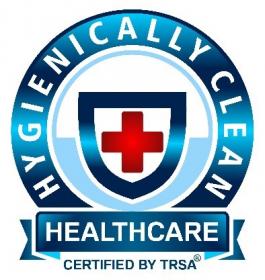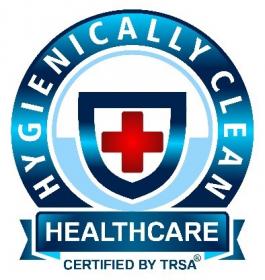Help with Clean Linen from Hygienically Clean Laundries Welcomed at APIC
Attendees of the Association for Professionals in Infection Control and Epidemiology (APIC) expo confirmed Thursday the value of effective guidelines for properly handling clean linen, substantiating Hygienically Clean Healthcare certified operators’ efforts to help them ensure linen remains safe and clean when it reaches patients.
Visitors to the Hygienically Clean exhibit at APIC’s Annual Conference were supported in this respect by receiving Handling Clean Linen in a Healthcare Environment, a guide produced by these certified linen, uniform and facility services operators. APIC attendees shared anecdotes of mishandling clean linen in their workplaces including:
- Employees holding and carrying stacks of bed linen and towels touching their chests
- Commingling clean and soiled linen
- Storing linen in closets in guest rooms instead of a secure linen room
Certified operators’ certification fees provided funding for creating and distributing the guide (and other resources for healthcare facilities), manifesting the Hygienically Clean program’s philosophy of addressing healthcare providers’ operational needs outside the scope of outsourced laundries’ traditional functions.
Angela Freeman, Hygienically Clean program manager, explained the importance of such laundries partnering with healthcare providers to create and implement plans to ensure clean textiles are delivered to patients. “When healthcare textiles (HCTs) reach a facility’s doors, an outsourced laundry’s role in maintaining their hygiene depends greatly on how the service agreement addresses linen distribution. Hygienically Clean’s resources for healthcare providers reflect the willingness of our certified operators to partner with their customers.”
A video version of the clean linen guide is in the works. TRSA, the global association for the linen and uniform services industry and Hygienically Clean administrator, continues to build the industry’s appreciation for partnering with healthcare customers.
In May, TRSA introduced Producing Hygienically Clean Textiles, an e-learning class to help laundry employees understand their roles in the processes, procedures and policies necessary to produce clean linens and uniforms. TRSA’s annual Healthcare Conference has guided industry managers in progressive linen distribution techniques to aid their training of their customers in these.
TRSA, Hygienically Clean Certification Hygiencally Clean Healthcare healthcare textiles APIC
TRSA






